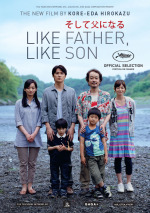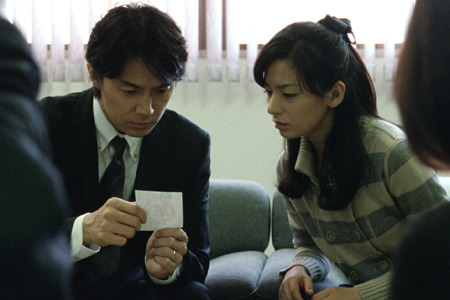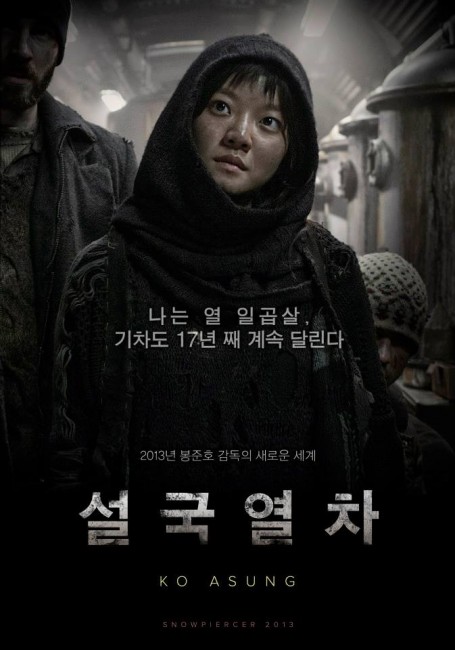TFE's coverage of the 51st New York Film Festival (Sep 27-Oct 14) is picking up pace. Here is Glenn discussing Like Father, Like Son.
 That foreign language category at the Oscars just continues to be a lightning rod for controversy (or "controversy" drummed up by eager beavers wanting get extra attention for their movies). Nathaniel already discussed some of the issues of that category as pertaining to the French non-selection of Blue is the Warmest Colour. Even curiouser than that, however, was the selection of Japan. Let's face it, a three-hour lesbian drama was always going to be a stretch for a nomination even if it did qualify and even if France did select it. Japan, however, appeared to have a slam dunk in the form of Kore-eda Hirokazu's Like Father, Like Son.
That foreign language category at the Oscars just continues to be a lightning rod for controversy (or "controversy" drummed up by eager beavers wanting get extra attention for their movies). Nathaniel already discussed some of the issues of that category as pertaining to the French non-selection of Blue is the Warmest Colour. Even curiouser than that, however, was the selection of Japan. Let's face it, a three-hour lesbian drama was always going to be a stretch for a nomination even if it did qualify and even if France did select it. Japan, however, appeared to have a slam dunk in the form of Kore-eda Hirokazu's Like Father, Like Son.
Even if we ignore the fact that it also won a big award at Cannes (the Jury Prize) from Steven Spielberg's jury and that the man himself has snapped up the rights for a remake. Even if we ignore that it's issues of frought father and son relationships put it in line with many other winners from the category. Even if we ignore that it's more refined palate, less scrappy and hip, is the sort of thing voters in this category tend to err towards. Even if we ignore all of that, the fact remains (for my two cents, at least) that the film is just really very good.
I, nor many other western audiences it would seem, have seen Japan's selection. The Great Passage. It may not only be a great film and I'm sure an Oscar nomination would make its producers double proud given the stink that has been raised by the American distributor of Kore-eda's film (the same company that is releasing Blue is the Warmest Colour - double ouch!). Still, it’s curious that Japan didn’t choose the Kore-eda when it seems to perfectly made for the ghetto category. I know it sounds entirely selfish and commerce-inclined, but I enjoyed Like Father, Like Son so much that it would have been nice to see it vying for the statue. It’s such a quality production that surely audiences, spurred by a nomination, could have turned it into a mild hit. Its likely February release now looks rather foolish and presumptuous, but it’s easy to see why the distributor thought they had a winner on their hands.

Like Father, Like Son is a wonderfully effective film about two families from vastly different socio-economic backgrounds who discover their babies were swapped at birth six years earlier. It sounds kind of silly and ripe for turgid melodrama, but it’s handled sublimely by the Kore-eda. He doesn't settle for simple sentimentality, but instead allows his characters to stumble, make bad choices, attempt to redeem themselves, and try to do what's right. The difference in their class background (one family is affluent, the other working class), their differing philosophies on raising a child (one fosters independence, the other family), the myth of motherly bonds, and their own individual sense of right and wrong are challenged by the sudden familial discovery.
Their world is very identifiable and it’s no wonder Spielberg wants to remake it. There are likely tears to be shed, but it earns them through the strength of the performances, especially by Ono Machiko and Yôko Maki as the wives, and the emotion wrung out of the complicated central story. It's also rare to see modern day Japan presented with such visual panache with its juxtaposition of cityscapes and rustic "authentic" locales. Whatever happens to the film now that it's out of foreign language competition, I just hope audiences get to discover it. Spielberg's future remake can only help audiences discover this affecting gem of a film.
 Wednesday, March 19, 2014 at 3:33PM
Wednesday, March 19, 2014 at 3:33PM  The youngest of film awards for Asian cinema (they have quite a few) is the Asian Film Awards which are now in their 8th year. Unlike the prestigious Golden Horse which (mostly) goes to Chinese language cinema, these encompass just about anything Asian: Japan, China, India, South Korea, The Phillipines and so on. Their best picture nominees this year:
The youngest of film awards for Asian cinema (they have quite a few) is the Asian Film Awards which are now in their 8th year. Unlike the prestigious Golden Horse which (mostly) goes to Chinese language cinema, these encompass just about anything Asian: Japan, China, India, South Korea, The Phillipines and so on. Their best picture nominees this year:



